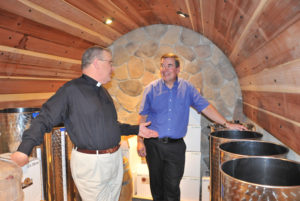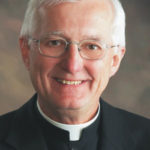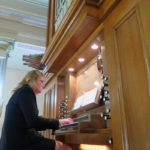Coralville parishioner serves as winemaker
By Lindsay Steele
The Catholic Messenger
CORALVILLE — As he speaks the words “fruit of the vine, work of human hands” during the Mass, Father Stephen Page can look into the congregation and see the face of the man who creates his parish’s sacramental wine.

Father Stephen Page, pastor of St. Thomas More Parish, looks at the wine cellar of parishioner Brian Manternach in Coralville May 28. Manternach, a member of St. Thomas More Parish in Coralville, produces the parish’s sacramental wine.
Brian Manternach, a longtime member of St. Thomas More Parish and owner of Coral Cellars in Coralville, began making the parish’s wine about a year ago. “It’s special to me that (my wine) is a part of the Mass,” Manternach said.
Fr. Page said he likes to support parish members’ business endeavors whenever possible. “I wanted a local source of wine … but I never had a parish member — that I knew of anyway — who could make the amount we needed and be able to adhere to the requirements,” the pastor said. The parish uses about four bottles of wine per week.
The pastor first heard of Manternach’s winemaking abilities from other parishioners about two years ago. He approached Manternach and asked if he might be interested in producing sacramental wine.
Manternach makes wine as a part-time business — his “real job” is working as a buildings accessibility team member at the University of Iowa. As a state and federally-licensed winemaker, he creates several varieties of wine from his in-home wine cellar, many of which are available for purchase at retailers in Johnson County. However, he had never been asked to make sacramental wine. “My initial thought was, this is an exciting opportunity but what are the requirements and hoops I will need to jump through? How much wine does a church go through in a year?”
He contacted the Diocese of Davenport and learned the rules for valid and licit sacramental wine production. He learned that the diocese views locally produced wine as an excellent way for a parish to practice Catholic Social Teaching on subsidiarity, care for the environment and economic justice.
According to the document, sacramental wine must be between 8 and 14 percent alcohol, natural and unadulterated and not mixed with other flavors or fruits. The fermentation process must be natural; that is, from the action of yeasts on the grapes themselves. Among other requirements, the addition of sugar to speed up the process or increase the alcohol content is not allowed. Manternach said he and Fr. Page were careful to make sure that the wine met all of the guidelines.
Manternach also made a special label for the wine, which contains a photograph of the church exterior. In cursive font is printed, “St. Thomas More, A Parish for All Seasons Sacramental Wine.”
Manternach admits it costs him more to produce the wine than what the parish is able to pay, but he doesn’t mind. He is proud to use his gift of winemaking to serve the church. “I feel privileged to have the opportunity to contribute some of my time, talent and treasure to the church in this unique way.”
Carol Manternach — Brian’s wife — thinks it’s fitting that her husband has become the parish winemaker. “His favorite sermons always were the ones about being the fruit of the vine.”











